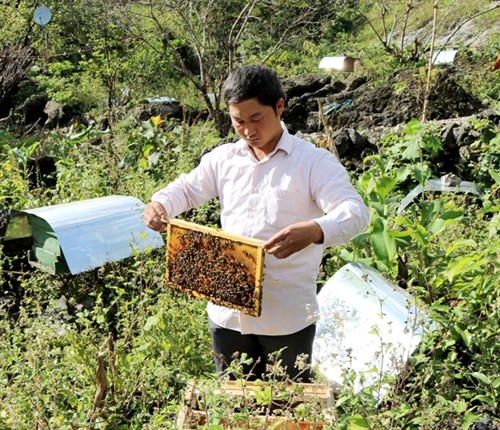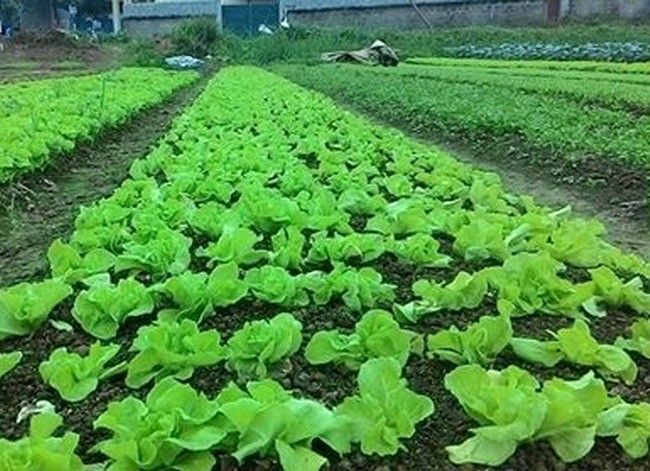(VOVWORLD) - A model of growing safe vegetables and keeping bees has been developed in Quan Ba district, Ha Giang province to help local ethnic people reduce poverty and build a stable income. The model has been working, thanks to favorable soil and climate.
 Quan Ba has more than 3,500 bee colonies. (Photo: dantocmiennui.vn) Quan Ba has more than 3,500 bee colonies. (Photo: dantocmiennui.vn) |
Quan Ba has more than 3,500 bee colonies thriving on the district’s many mint fields, forest flowers of various kinds, and medicinal herb trees. Beekeeping has a long history in Quyết Tiến, but in the past it was done sporadically on a small scale for domestic use only. In recent years, beekeeping has earned higher profits for beekeepers.
Realizing the benefits of keeping bees for honey, Le Trung Kien, Chairman of the Quyet Tien Commune People’s Committee, invested in 300 bee colonies.
In addition to developing bee colonies, he has traveled to other places to studying their methods and returned to open local experience-sharing courses. Quyet Tien now keeps bees and sells 3 kinds of honey synched with the local flower seasons: mint honey, medicinal herb honey. Mint honey has been the most popular because of its enticing aroma and light sweet flavor.
Kien said Ha Giang has established an Association of Beekeepers and Cooperatives to develop bee production.
“Ha Giang province and Quan Ba district are promoting honey products, especially mint honey and medicinal herb honey. The farmers themselves have also been actively advertising their products. But the most important thing is to ensure quality and hygiene because a qualified product is the best promotion,” Kien added.
 The model of growing safe vegetables in Quan Ba district. (Photo: quyhotronongdan.vn) The model of growing safe vegetables in Quan Ba district. (Photo: quyhotronongdan.vn) |
Last year Quyet Tien commune began a VietGap safe vegetable farming model which has increased profits for local people and boosted agricultural production.
Later the same year, with the State’s financial support, Lu Dung Trung’s family in Bo Lach hamlet converted 1 hectare of rice to vegetables grown in net houses equipped with automatic irrigation systems.
Trung said the model has significantly reduced needed labor while profits have increased.
Trung explained: “We don’t use insecticides anymore, our products are very safe. Currently I’m harvesting cabbage and will begin to grow tomatoes and several other vegetables. One advantage is that there are no insect pests when you grow vegetables in a net house.”
Hoang Van Dung from Quan Ba’s Agriculture Division said that the district has closely instructed local farmers in regards of seasons, crop structure, and intensive farming to help them increase productivity. More particularly, in some specialized cultivation areas, the locals have applied science and technology like the net house model, Dung said.
He said: “Revenue from growing vegetables in the net house is 4 to 5 times higher than cultivating rice and corn. The district has organized a training course to instruct farmers how to apply VietGAP standards and use insecticide and fertilizers, and has provided them with seedlings. Under our project by 2020, there will be additional 7 hectares of land to build net houses and 50 hectares of safe vegetables.”
Quan Ba district has set up a showroom in Nam Luong hamlet, Quyet Tien commune, while calling on local enterprises and cooperatives to participate in the production of safe vegetables for exports. Quan Ba has informed farmers of the benefits of the clean agricultural production, promulgated incentives for investment attraction, and formed safe food distribution chains.